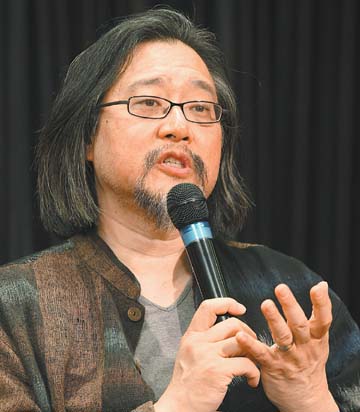|
Debra Li

After a six-year break, Taiwanese playwright and director Stan Lai has returned with a new crosstalk play that was a huge success in Taiwan in March. The tour will arrive in Shenzhen at the end of July.
IN 1984, Lai and his newly formed Performance Workshop Theater began seven months of improvisational work that culminated in the March 1985 premiere of “That Evening We Performed Crosstalk,” a production that made the company’s name and revolutionized Taiwan theater. When a recording of the play was released later that year, it sold 1 million copies.
Lai had brought crosstalk, a form of traditional Chinese comedy, to a new audience that quickly became infatuated with it. Traditional crosstalk, lasting 10 to 20 minutes, is often presented by two performers who deliver their lines in a rapid-fire, bantering style with a strong Beijing accent.
“So basically, my crosstalk play is a play, with a plotline and inner logic during the two-hour performance,” explained Lai.
“There is not much comedy in Chinese society or literature. It’s not in our blood as Chinese people, but as a nation, we do have a good sense of humor.”
Perhaps because the common people of China have experienced a lot of tragedy throughout the country’s long history, they are hungry for some decent comedy.
Despite his huge market success with the series — the most recent being “Total Woman” in 2005 — no other directors have followed suit.
“Either they don’t think it worthwhile, or they think a crosstalk play too difficult to do,” Lai joked.
“For me, each time it gets more difficult. It’s such a unique form, because we created a form of crosstalk that is a whole evening, based on a whole theme instead of short pieces,” Lai said.
“Crosstalk Travelers,” a collaboration between Lai and TV producer Wang Wei-chung, is the seventh in the series. Lai and Wang’s first collaboration, “The Village,” was a stage hit in 2008.
The new play features actors Feng Yi-kang and Chu Chung-heng, who led the audience on a journey that spans a dozen countries as two travelers, marooned on a South Pacific island, reminisce about past journeys.
“I’m not an autobiographical writer, you can’t find me in my work. But this time I put my own travel memories in,” Lai said. “Sometimes, I do backpack travel to remote places like the role played by Chu, and other times, I travel in luxury like the role played by Feng.”
“Feng has his own crosstalk group, he’s very good at this. Chu has been in four straight productions of mine, and he’s a fan of our crosstalk and a wonderful actor,” Lai said.
Unlike his previous productions that give some serious thought to the scars of society and struggles of the disadvantaged, “Crosstalk Travelers” is more light-hearted and fun.
For example, there is a hilarious episode in the show about traveling in India.
“You should go to India if there is a chance,” Lai said. “It’s a country where your life experience will not help at all. There is not much difference in the way an Indian nods his head and shakes his head, so sometimes it’s very difficult to figure out his real intentions.”
The director once asked directions to the bathroom at a highway service station, and still couldn’t get it after an Indian gestured and talked to him for a while. In the end he figured out that there was no bathroom at the station at all.
“Sometimes people can get addicted to traveling. The world is so big that there is no end to a person’s exploration,” Lai said. “Sometimes people keep traveling to escape from reality. If you are escaping from something, finally you still have to confront your own problems no matter how far you have traveled. And no matter how far you have traveled, a phone call from your love and family will take you back home.”
With the new show, Lai is trying to prove that a play is not necessarily shallow if it’s not heavy. It can bring warmth and laughter and can encourage some reflection about your lifestyle.
2nd-round excavation at Qin Shihuang Mausoleum
CHINESE archaeologists have started a second round of excavations of a burial pit of Qin Shihuang (259-210 B.C.) Mausoleum in northwestern Shaanxi Province.
The burial pit, coded K9901, is one of 180 funerary pits in the Qin Mausoleum. Previous excavations in March 1999 produced a giant bronze cooking vessel and 11 terracotta figurines with bare upper bodies.
Cao Wei, deputy head of the Museum of the Terracotta Warriors, said the pit was unique because the terracotta warriors were without armor and could be acrobats.
The new excavation started Friday. The previous excavation covered less than 10 percent of the 700-square-meter pit and was not enough to give a full picture of the structure, said Zhang Weixing, head of the archaeological team.
Since 1974, Chinese archaeologists have excavated more than 30 funerary pits in the Mausoleum of Qin Shihuang, the first emperor to unite China. An army of more than 7,000 life-sized terracotta warriors and horses were first discovered at the site in 1974. The mausoleum was later declared a National Heritage and World Heritage site.
(SD-Agencies)
|

